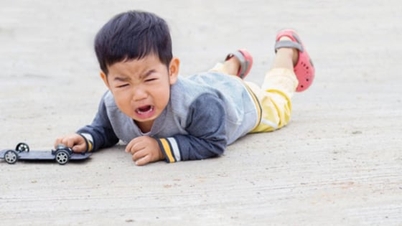According to a survey in the US, 86% of parents agree that children aged 2 to 12 today swear more than when they were young. Of those, 54% said their children had cursed in front of them, even though 20% of them did not fully understand the meaning of the words they had just said.
Swearing is a rude way to express emotions. At worst, it actually hinders a person's ability to express their emotional experiences. So whether a child hears bad things from adults, at school, or on TV, it's important for parents to help their children understand the harmful effects.

Illustration
Avoid overreacting
No matter what age your child is, parents need to address the issue immediately and calmly. For children 6 and under, start with a simple reminder like, “You are never allowed to swear.”
For older children who are able to think more abstractly, parents should explain why swearing is not allowed. The goal is to ensure that children are able to express their feelings, communicate, and express themselves in the best way possible without using negative words.
If parents get upset when their child swears, the child may develop the idea that he or she has the ability to get their parents' attention when he or she swears.
Correct your child as soon as he or she starts swearing.
Some parents believe that calling attention to their child’s inappropriate language will only encourage the behavior, so they choose to ignore it. But how will children learn that swearing is bad behavior if parents don’t teach them?
Ask your child if he or she understands the word he or she used. If the answer is “no,” explain that the word is offensive, harmful to others, and unacceptable.
If your child understands the word, you need to explain and seriously remind him why he is not allowed to use that word.

Illustration
Don't be tempted by social media fame
Sometimes, a video of a child swearing is the reason why they are attracted to it and think that this behavior is cool and then imitate it. This is extremely dangerous. It is best for parents to limit the content their children access on social media platforms.
Be honest
When parents reprimand their children, they may ask back: “But I heard you say it.” In this situation, parents should not deny or argue with their children.
Instead, acknowledge that everyone has trouble controlling what they say. That way, you'll be honest with your child about your mistake and make them feel like they're dealing with an adult problem, which will help them learn to deal with it in a more mature way.
Find new words
Sit down with your child and brainstorm new, non-offensive words or phrases to say when he or she feels frustrated, upset, or angry.
Encourage your child to use other words to describe how they feel. This can expand their vocabulary and help turn a bad moment into a bonding moment.

Illustration
Create consequences
If the above methods do not work or if your child has developed a habit of swearing, parents need to take stronger measures to show their child that this behavior is inappropriate.
For example, every time a child is caught swearing, parents will take back 20 thousand from their pocket money or give them extra chores to do.
Find new joy
If the whole family needs to change the way they use language, group activities can be a fun and effective way to eliminate negative speech. Make time for a fun activity, such as a movie night together.
Care more about your children
To help children avoid anger or frustration, parents need to show kindness to their children.
Talk to your child gently and explain that swearing hurts others. Children are often more willing to do things that their parents praise. When they receive kindness and praise, they will make an effort to stop swearing.
Source: https://giadinhonline.vn/cha-me-nen-lam-gi-khi-con-noi-tuc-d199374.html


![[Photo] Press delegation meeting to visit Truong Sa and DK1 Platform](https://vphoto.vietnam.vn/thumb/1200x675/vietnam/resource/IMAGE/2025/5/22/6b8d232877ec421a9e8187d83b9f8006)
![[Photo] General Secretary To Lam chairs a working session with the Central Internal Affairs Commission](https://vphoto.vietnam.vn/thumb/1200x675/vietnam/resource/IMAGE/2025/5/22/3b7790f499da45b2803d8ae253207ef1)


![[Photo] T&T 1 and Ho Chi Minh City 1 People's Police Teams won the men's and women's team championships](https://vphoto.vietnam.vn/thumb/1200x675/vietnam/resource/IMAGE/2025/5/22/39db06ae67cb4001b7a556e8d9a56d07)
![[Photo] Prime Minister Pham Minh Chinh chairs meeting on draft Resolution of National Assembly on International Financial Center in Vietnam](https://vphoto.vietnam.vn/thumb/1200x675/vietnam/resource/IMAGE/2025/5/22/d398664ff1a140629169ea5a24e1b4d0)












































































![[Podcast] Week introducing more than 500 OCOP products in Hanoi](https://vphoto.vietnam.vn/thumb/402x226/vietnam/resource/IMAGE/2025/5/22/d144aac2416744718388dbae3260e7fd)





Comment (0)